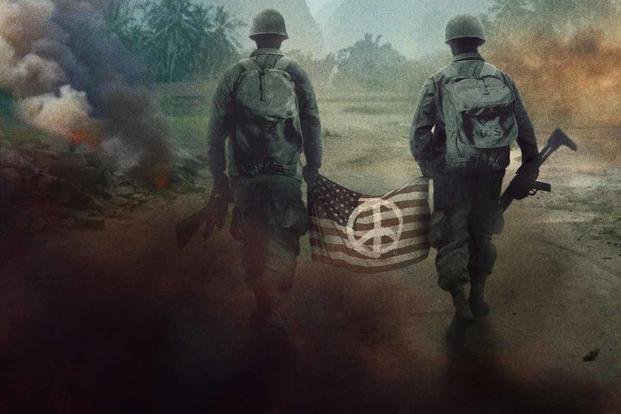April 30, 2025, marks the 50th anniversary of the fall of Saigon, the end of South Vietnam and the conclusion of the Vietnam War. The toll it took on both North and South was enormous: 1.1 million North Vietnamese and Viet Cong fighters died in the war, along with 250,000 South Vietnamese troops and 58,220 American service members.
U.S. intervention in the Vietnam War left the country forever changed and Americans would never again have complete faith in their elected leaders. The war is the subject of a new five-part Netflix documentary series, the latest in director and executive producer Brian Knappenberger’s “Turning Point” anthology. “Turning Point: The Vietnam War” isn’t a battle-by-battle war documentary; it reveals the outsized effect the war had on the countries who fought it.
“I do think it’s a turning point in American history,” Knappenberger told Military.com. “I do think that the America that existed before the United States engaged militarily in Vietnam is just a very different America than the America that emerged after Vietnam or after our troops came home.”
Read Next: Canada Faked a Nazi Invasion of Winnipeg to Raise Money for War Bonds
One of Knappenberger’s previous “Turning Point” projects was 2024’s “Turning Point: The Bomb and the Cold War.” In it, the filmmaker touches on the Vietnam War as a part of the greater conflict between communism and capitalism, but he felt like he needed to take a deeper look into the Vietnam era because of the profound effect the war had on the United States, both the people who fought the war and the Americans back home.
“A lot of the roots of what plagues our society today, like widespread alienation, deep cynicism, profound distrust in government, breakdown of civic institutions is still with us,” the director said. “It affected so many peoples’ lives. More than 58,000 American soldiers died, and there’s a ripple effect to friends and family that created a very, very deep wound in this country. So there’s a personal kind of cost, but there’s also just a sense of what it said about us, a cost that comes out of our own identity, our own sense of who we are as a country.”
This latest “Turning Point” is more than just a historical account of a bygone era. The parallels to more recent history are difficult to ignore, and that’s by design. Knappenberger and his crew set out to not only make a compelling Vietnam documentary but also leave viewers with questions one might ask about more recent American conflicts.
It’s difficult to overestimate the war’s impact, and Knappenberger draws on fascinating sources of information and analysis in relaying the scope of the conflict. The show presents facts from three sides: North Vietnamese, South Vietnamese and American.
From the communist perspective, he gets interviews from North Vietnamese Army veterans as well as former Viet Cong guerrilla fighters and political officials. Knappenberger also talked to Lê Kiên Thành, the son of North Vietnam’s Communist Party boss, Lê Duẩn. From the South Vietnamese, viewers will hear My Lai Massacre survivors, South Vietnam’s Army veterans, refugees who fled the fall of Saigon and Hoàng Đức Nhã, adviser to South Vietnamese President Nguyễn Văn Thiệu.
“So often, the events of this war are told from the American perspective only, and I think that’s important, and it’s important to me,” said Knappenberger, whose father is a Vietnam veteran. “In Vietnam, this is a civil war as much as anything else, and I don’t think the understanding of these events can be separated from the fact that there are two very different parts of the country. They had very, very different visions of what their future might look like so I thought it was very important to get as many of those voices in as we could.”
For the American perspective, there are, of course, Vietnam War veterans like Ronald Haeberle, who photographed the My Lai Massacre, and Jan Barry, who would later co-found Vietnam Veterans Against the War. He also talks to journalists who covered the war, such as CBS’ Dan Rather and Peter Arnett, who covered the war for The Associated Press. Also featured are intelligence and National Security Council officials, such as Winston Lord and John Negroponte.
Knappenberger and his team got unrestricted access to the CBS archives, rare North and South Vietnamese footage as well as recently declassified U.S. government recording and hundreds of hours of White House audio tapes. They used this trove of imagery to create an unflinchingly critical look at the effects of the Vietnam War, both then and now.
“A lot of veterans, my dad included, talked about this uprising of anti-war sentiment in the United States, that the war was unwinnable, that we shouldn’t be there,” Knappenberger said. “A lot of that anger, while legitimate, was unfairly focused on the soldiers that were coming home. I think it contributed to extending the trauma they had to go through. It just was unfair. Whether you like the war or you don’t, these are soldiers that we asked to go fight it. In some cases, they were drafted, so they were forced to go fight it. It hurt a lot of people, and it’s clearly unfair in the end. I hope, really hope, we’ve approached this with respect for those soldiers.”
“Turning Point: The Vietnam War” is streaming on Netflix now.
Related: Frantic Refugees, Helicopters Pushed Overboard: Memories of the Fall of Saigon 50 Years Later
Keep Up With the Best in Military Entertainment
Whether you’re looking for news and entertainment, thinking of joining the military or keeping up with military life and benefits, Military.com has you covered. Subscribe to the Military.com newsletter to have military news, updates and resources delivered straight to your inbox.
Story Continues
Read the full article here





